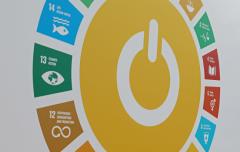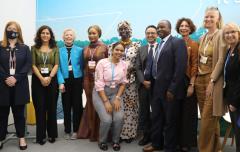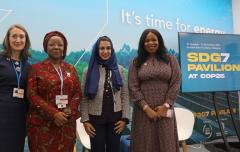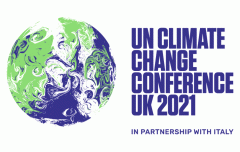SEforALL COP23 Wrap-Up: Encouraging signs, but challenges remain
BONN, Germany - The UN Climate Conference (COP23) that ended on Saturday here produced important gains on several key issues for Sustainable Energy for All, but big challenges remain.
Held in sprawling white-domed meeting areas along the Rhine River, COP23’s primary purpose was to advance progress for a successful, inclusive and ambitious implementation of the Paris Agreement, the historic global accord that calls for slowing greenhouse gas emissions to limit climate warming to below 2 degrees Celsius.
Among the key issues that emerged during two weeks of discussion on transforming the accord’s bold ambition into reality: phasing out coal and fossil fuels; giving sub-national actors, such as businesses and states, a bigger role; elevating women’s participation and leaving no one behind in the global clean energy transition.
A Paris Agreement for all
Women’s empowerment and social inclusion got deservedly more attention on the global stage for tackling climate change and achieving sustainable energy access for all, most noticeably through the Gender Action Plan agreed for the first time during a COP. Leaving no one behind – whether ‘last mile’ populations living in energy poverty or coal-centered regions threatened by a low-carbon future – also gained more traction.
“Part of the ambition of the Paris Agreement was to ‘leave no one behind.’ To keep this promise, we need to think differently about how we deliver affordable, reliable and modern energy services to those who are most marginalized,” said Rachel Kyte, Special Representative to the UN Secretary-General and CEO, Sustainable Energy for All, in announcing a new People-Centered Accelerator initiative at COP23 that aims to accelerate women’s involvement sustainable energy and energy access efforts across the world.
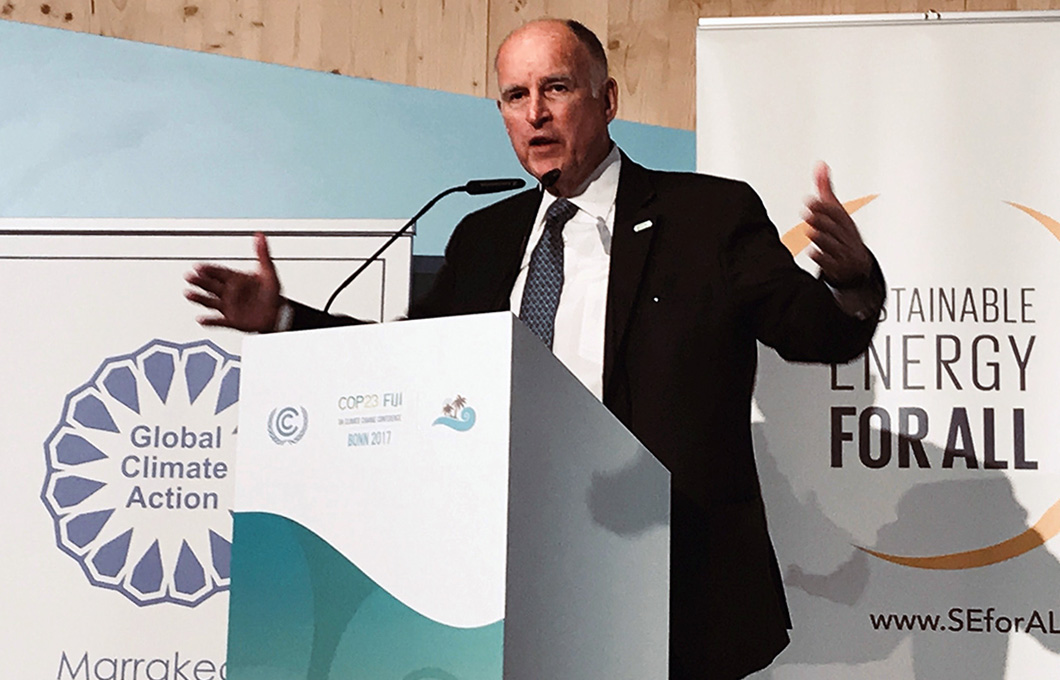 COP23 High-Level Plenary - Urban Energy/Transport Nexus: Jerry Brown, Governor, California
COP23 High-Level Plenary - Urban Energy/Transport Nexus: Jerry Brown, Governor, CaliforniaReducing fossil fuel’s shadow
Yet, the big-picture COP challenges remain as colossal as ever, a point made clear by a new report showing that, after three consecutive years of flat emissions, global CO2 pollution levels are rising again in 2017, with China and its ramped-up coal use being a big reason why.
Curbing the world’s reliance on coal and other fossil fuels continues to be a big litmus test, and COP23 made clear there are disagreements on how quickly that shift will happen. One of the major announcements during COP23 was the formation of the Powering Past Coal Alliance, a coalition of 20 countries and 15 states committed to phasing out coal power. Participating countries include Canada, the UK, Mexico and Angola, yet big emitters like Germany, China, India and the United States have not yet added their names to the list.
Another important marker in the shift away from fossil fuels was Norway’s $1 trillion wealth fund proposing last week to drop oil and gas companies from its benchmark index.
Nineteen member countries of the “Biofuture Platform,” including Brazil, China, Egypt, France, India, Morocco and Mozambique, announced a formal agreement to develop targets for biofuels and a plan to achieve those targets. “Sustainable biofuels can provide solutions to the energy transport nexus. This partnership offers us that chance,” Kyte said.
Two U.S. Delegations
The highest profile moment of COP23’s first week was a major contingent of US companies, governors, mayors and other national leaders meeting at the US Pavilion for an all-day “We Are Still In” rally in support of the Paris accord. California Governor Jerry Brown and former New York City Mayor Michael Bloomberg announced “America’s Pledge,” an initiative to compile and quantify actions of states, cities and businesses to drive down emissions consistent with the Paris goals. Two days later, the formal U.S delegation representing the Trump administration held a discussion on the merits of embracing coal and other fossil fuels to lift emerging economies out of energy poverty, including countries where electricity does not exist for many people.
Like many, Kyte took strong exception to such claims and offered a quicker, less-costly solution for providing electricity to under-served populations: decentralized renewable energy. “It’s positively possible to bring (renewable energy) solutions to these communities more quickly,” she said. “Adding more coal (power) to centralized electric grids is not a solution.”
Kyte’s remarks came as SEforALL was announcing a first-of-its-kind report highlighting the benefits that countries can expect by providing renewable-based power, such as solar, more quickly to under-served populations. The new Why Wait? Seizing the Energy Access Dividend report uses Bangladesh, Ethiopia and Kenya as examples to showcase how households would save money, improve study times and reduce pollution by using solar power, instead of kerosene, as their primary energy source. The report was produced in partnership with Power for All and the Overseas Development Institute – with generous support from the Wallace Global Fund.
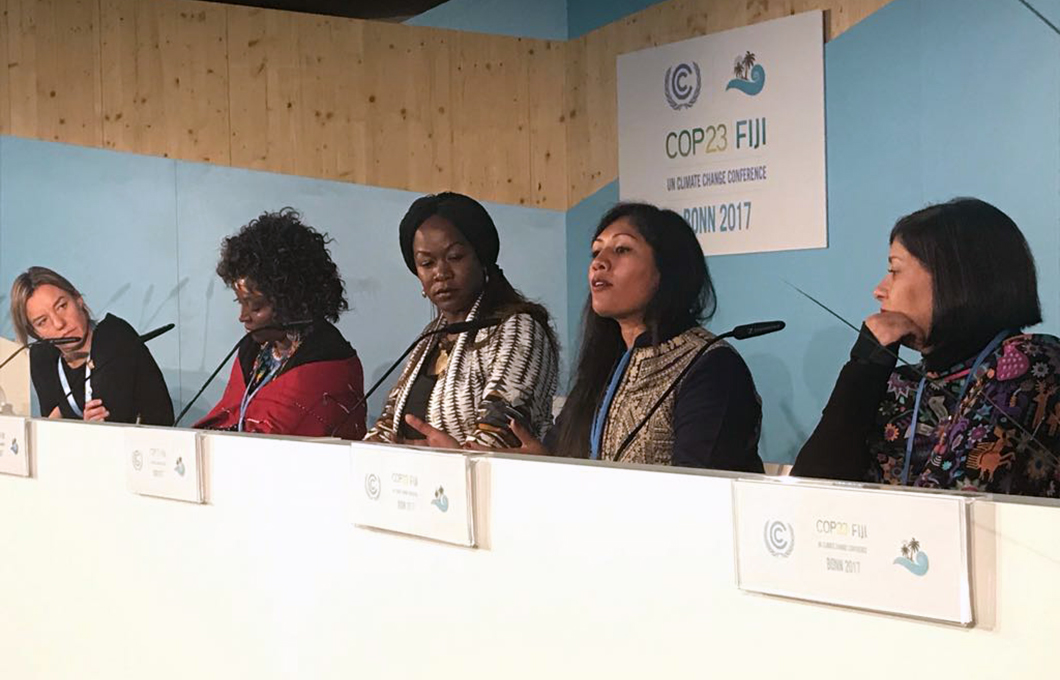 COP23 Side Event - A People-Centered Accelerator. Left to Right: Tara Shine, Special Adviser, Mary Robinson Foundation – Climate Justice, Agnes Leina, Executive Director and founder of Il’laramatak Community Concerns, Linda Davis, Director of Partnerships, wPower Hub, Ajaita Shah, Founder and CEO, Frontier Markets, Lorena Aguilar, Global Senior Gender Adviser-IUCN
COP23 Side Event - A People-Centered Accelerator. Left to Right: Tara Shine, Special Adviser, Mary Robinson Foundation – Climate Justice, Agnes Leina, Executive Director and founder of Il’laramatak Community Concerns, Linda Davis, Director of Partnerships, wPower Hub, Ajaita Shah, Founder and CEO, Frontier Markets, Lorena Aguilar, Global Senior Gender Adviser-IUCNSEforALL highlights
Other key SEforALL activity and announcements during a busy two weeks in Germany included:
- People-Centered Accelerator: During Gender Day at COP23, SEforALL and dozens of partners launched the People-Centered Accelerator, a partnership-led initiative that aims to advance social inclusion, gender equality and women’s empowerment in sustainable energy efforts globally. The initiative, developed with over 40 organizations from across government, civil society, private sector and finance, aims to gain and improve clean energy access for those who will not be reached with business-as-usual approaches. Key priorities are to: unlock finance; strengthen collaborations between stakeholders concerned with energy, gender and social justice; and increase women’s full participation in sustainable energy solutions globally.
An Accelerator side event, featuring a dozen women leaders in sustainable energy efforts around the world, attracted a packed audience.
- Opening Doors: In conjunction with the Accelerator launch, SEforALL announced a new report mapping efforts that are already underway to end energy poverty and advance clean energy solutions by empowering women and promoting gender equality and social inclusion. The report, Opening Doors: Mapping the Landscape for Sustainable Energy, Gender Diversity and Social Inclusion, maps the global landscape of support for women and marginalized groups in sustainable energy across organizations, programs and policies. It focuses on 45 countries that are most critical to achieve Sustainable Development Goal 7 targets, which call for universal access to sustainable energy services by 2030. The Opening Doors report was made possible with funding from the Wallace Global Fund.
- The Energy, Cities and Transport Nexus: In partnership with the Global Covenant of Mayors, C40 and SLoCaT, SEforALL brought together a diverse panel of global mayors, business executives and national leaders to discuss the growing importance of cities in achieving the Paris goals. California Governor Jerry Brown called for “more elegant landscapes” and curbing cars. Diverse perspectives from mayors in Africa, Europe and South America made it clear that cities face wide-ranging challenges, depending on location and income levels. While wealthy cities like Oslo, Norway can afford ride-sharing lanes and car-free zones, developing cities like Tshwane, South Africa face the fundamental challenge of brutal worker commuting times that eat up more than half of their salaries.
- Energy Day: As part of UNFCCC’s Global Climate Action series, Energy Day was held during the first week of COP23 to highlight success stories and challenges on the path toward a clean, efficient and sustainable energy future. SEforALL hosted a “State of Play” session that left no doubt that the clean energy transformation is moving forward faster than ever. With speakers from cities and villages in Canada, Nepal and South Africa, to major electric utilities and oil companies in Europe, the conversation showed that momentum on renewable energy, energy efficiency and energy access is gaining unprecedented strength. But far bigger gains are needed. The challenge of achieving the Paris climate goals, while also providing clean, affordable energy to remote regions that still lack any electricity came up time and time again.
Ram Prasad Dhital, Executive Director of the Alternative Energy Promotions Centre in Nepal, cited SEforALL’s recent Energizing Finance report showing that energy access finance is going mostly to electric grid infrastructure, not decentralized renewable solutions. “Off-grid solutions are not getting resources,” he said.
